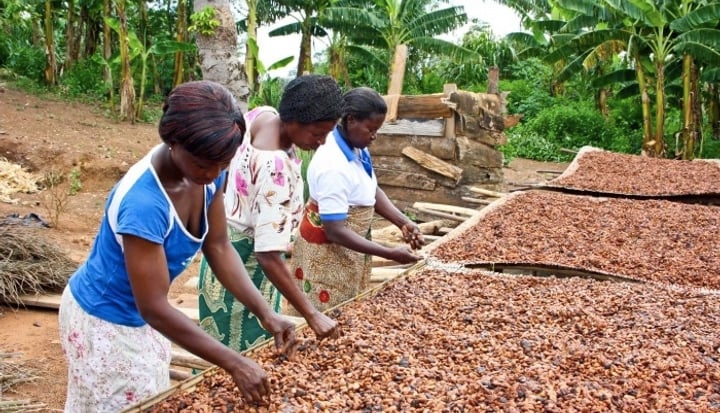When Florence Njiraini’s new husband gifted her 1,500 coffee plants on the slopes of Mt. Kenya years ago, she knew almost nothing about farming. Determined to make her plot a success, she set about learning as much as she could, and soon she was employing sustainable growing practices. Njiraini is not only successful as a farmer but also as a leader. Today, Njiraini is the lead farmer for the Mutira Farmers’ Cooperative, a group of more than 5,500 Kenyan smallholders that has been Rainforest Alliance Certified since 2013—and she’s a model to other farmers, particularly women, throughout her region.
Whilst we reflect on the importance of ‘gender balance’ during this year’s International Woman’s Day the reality is that there’s still a long way to go for women to achieve gender equality and equal access to resources in farms globally. Nearly half the world’s agricultural work is performed by women but, unsurprisingly, they have far less access to resources than men do. In fact, when people talk about farmers, they usually refer to the men. If the playing field were made level, women could increase their farm yields by 20-30%, according to the Food and Agriculture Organization. And if women were paid fairly, businesses in all sectors would also see benefits in terms of staff retention, productivity and the general wellbeing of their workforce.
Development experts believe gender equality will be critical to global food security in the coming decades, as the world’s farmers struggle to produce food for a rapidly growing population on a shrinking area of arable land. In Latin America, one in five farmworkers is a woman, and in East Asia and sub-Saharan Africa, half of all agricultural laborers are women. Yet women in developing countries often have no, or less access to resources (such as credit), training and information than their male counterparts which often results in lower crop yields.
At the same time, numerous studies have shown that when women control household income, they are more likely than men to spend money on their families (food, clothing, education and health-related items)—with benefits for the entire community. Research shows a 20 percent increase in childhood survival rates when women manage their household budget. And when women farmers are given equal access and control to resources, education, financing, and land rights, they can increase farm yields by 20 to 30 percent.
Meantime, pressure is mounting on business from governments, NGOs and civil society to comply with the UN guidelines for Business and Human rights. This is particularly true for forced labour issues, which are strongly linked to gender and for sexual harassment, as evidenced by the growth of social movements such as #MeToo. The welcome news is that companies are starting to take these issues more seriously.
Women’s organisations, particularly in the farming and agricultural sectors, have been getting stronger; and specifically, products made by women are becoming more and more sought after.
Also, in the coffee sector, one of Rainforest Alliance’s key commodity areas which we certify, gender issues are starting to receive more attention. In 2018, the central theme of international coffee day was “women in coffee” that was highlighted with the publication of a documentary on gender in coffee.
Within the coffee sector, the International Women in Coffee Alliance, was funded in 2003 by women from Costa Rica, Nicaragua, and the US, and now has 22 country chapters. One of these has organised regional competitions of women coffee grafters in the last five years.
There is a broad consensus among development and supply chain experts that without women’s empowerment the world will not meet the UN Sustainable Development Goals by 2030. At the Rainforest Alliance, we’ve seen that the advancement of women is key to improving sustainable livelihoods in the agricultural sector. Multiple studies have shown that when women gain more economic strength, their families and communities benefit as well.
These benefits over time cascade across the whole sector. We consider men’s participation in women’s empowerment initiatives as an integral part of the process to achieve gender equality. Disregarding their role can lead to undesired outcomes, such as low participation rates by women and lack of sustainability over time, or even increased gender-based violence.
And all sectors, not just agriculture, have something to gain from enhanced gender equality and social equity.
In addition, gender equality can provide businesses with the opportunity to hire from a wider pool of talent, gain greater insights into consumers’ needs, and improve the security and quality of supply.
Companies that haven’t done so already should make 2019 the year to take action on gender equality. As the #Balanceforbetter campaign highlights “everyone has a part to play – all the time, everywhere. From grassroots activism to worldwide action, we are entering an exciting period of history where the world expects balance. We notice its absence and celebrate its presence.”
It is clear that we need more balance for a better world. Why wouldn’t everyone strive for equal rights and opportunities for men AND women involved in producing our daily coffee?
Let’s all help create a #BalanceforBetter.










